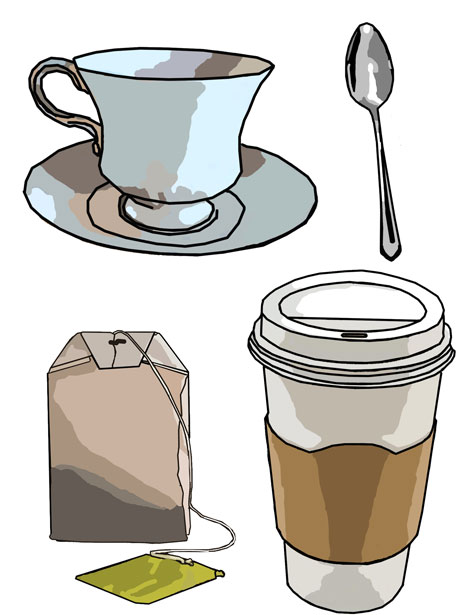It’s common to see students rushing into their first-period class with a cup of coffee or to hear of students drinking energy drinks to stay awake to finish an important project. There seem to be only two choices: never drink caffeine or have it every day. In a recent survey, 93% of Americans reported consuming caffeine regularly. Across the entire world, the percentage was 90%. Although having something like coffee, tea, soda or an energy drink is the social norm, there are more consequences than benefits to consuming caffeine every day.
No matter what time of day, caffeine is almost always effective in providing consumers with additional energy. Caffeine works, in short, by blocking biochemical reactions. The natural way one becomes tired is by specific receptors in the brain connecting with a chemical called adenosine to create a reaction. When you drink caffeine, the new chemical from your drink blocks the adenosine receptors. This process doesn’t actually “wake you up;” it simply stops the body’s natural preparation for sleep, hence why users feel so tired once the caffeine wears off.
Just like any other drug, caffeine can be addictive. If someone drinks coffee each day, they develop a tolerance, and more caffeine is needed to keep them awake. This is due to more adenosine receptors being created, and more caffeine being required to block biochemical reactions. It takes as little as 100 mg of caffeine a day to become “addicted,” meaning all it takes is one cup of coffee or an energy drink a day to cause an overreliance.
Those who become addicted to caffeine can find it difficult to function without it. When an avid coffee drinker stops drinking caffeine, their body goes through withdrawal.
Withdrawing from caffeine after extended use can cause headaches, fatigue, loss of energy, decreased alertness, depression and overall feelings of “fogginess.” Headaches are the most common, with headaches happening to 50% of those who experience caffeine withdrawal. The symptoms can appear as soon as 12-24 hours after the drug has left the system but become more severe as time goes on—those who suddenly withdraw from caffeine claim they “aren’t really there” and are not themselves.
Sudden withdrawal can be dangerous, but so is the continuous usage of caffeine. If this happens, there can be long-term, adverse health effects. One of these side effects is increased anxiety. This occurs since caffeine is a stimulant, which makes the physiological and nervous activity in the body speed up, causing an increased respiratory rate, heart rate and blood pressure. In addition, anxiety can exacerbate other side effects, including difficulties falling asleep and feeling unable to sit still.
Another long-term effect is the increased possibility of developing certain diseases. For example, since caffeine affects the cardiovascular system, the raised heart rate and blood pressure can lead to cardiovascular disease. Without proper treatment, this can escalate to a heart attack, heart failure or a stroke.
Caffeine doesn’t just raise one’s potential for diseases: it’s a killer. When caffeine is overused, it can turn toxic and become lethal. In 2017, 92 people died from a caffeine overdose. Luckily, this is a minute number compared to the total number of people who consume an unhealthy amount of caffeine. Still, it’s a possibility.
If the increased risk of health complications isn’t reason enough, consider the financial consequences of having a caffeinated beverage each day. For an ordinary caffeinated drink, it doesn’t seem that expensive. It’s only a dollar or two a day, right? However, depending on which caffeinated beverage is purchased, it can quickly add up.
At America’s favorite coffee shop, Starbucks, millions of customers visit stores to buy coffee daily. The “standard” cup of coffee is a medium roast in a grande size, priced at $2.10. If a java lover drinks coffee daily, that’s $14.70 per week or $766.50 per year. Considering this is one of the cheaper coffee types offered at Starbucks, the cost will likely be much higher for larger and fancier blends.
Every consequence of caffeine should be considered, but only a severe addiction will cause lasting problems. The most severe repercussions won’t happen unless too much caffeine is consumed; it’s typically fine in moderation. If a daily coffee drinker gradually reduces their consumption, they won’t experience the side effects of a sudden withdrawal. It’s probably healthiest to not consume caffeine at all, but if one only has caffeine once or twice a week, these severe consequences can be avoided.



























